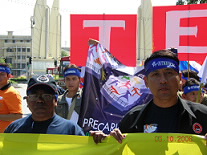ACTRAV Symposium on Precarious Work (4-7 October, 2011)
Worldwide, millions of workers suffer from precarious working conditions. They work, but lack decent jobs, security, protection and rights. The universality and sheer numerical dimension of the problem call for regulation on the international level. Trade Unions are expecting the ILO to live up to the Organization’s responsibility to address more comprehensively the challenge of widespread precarious employment in the world of work.
Context
Worldwide, millions of workers suffer from precarious working conditions. They work, but lack decent jobs, security, protection and rights. The universality and sheer numerical dimension of the problem call for regulation on the international level. Trade Unions are expecting the ILO to live up to the Organization’s responsibility to address more comprehensively the challenge of widespread precarious employment in the world of work.

The resolution accompanying the adoption of the Employment Relationship Recommendation No. 198 in 2006 emphasized the importance of authoritative work by the ILO in this area.The ILO Committee of Experts has made reference to precarious work in relation to a number of ILO Conventions, suggesting that considerable protection against precarious employment could be achieved through full implementation of existing instruments. The Experts also identified a number of gaps in the current body of international labour standards which means that the standards cannot effectively address various forms of precarious employment and informality. This assessment provides considerable guidance to any discussions about promoting the ratification and implementation of ILO Conventions, making better use of the ILO supervisory mechanisms and considering possible future instruments to address existing gaps.
Forms and diversity of precarious Work
The precariousness of work arrangements is heterogeneous and multifaceted depending on the country, region, and the economic and social structure of the political systems and labour markets. The scope and different forms are ever expanding, as unscrupulous employers are always trying to circumvent regulations or to find loopholes in regulations in order to increase the profitability of their business at the expense of their employees. Nonetheless, common characteristics of precariousness are the absence or the insufficient level or rights and protection at the workplace. While informal employment is obviously precarious, this is also increasingly true for many forms of formal employment including sub-contracting, temporary contracts, agency work, fake self employment and involuntary part-time .
In many countries laws forbid workers employed through a third party from joining unions of permanent workers. So while the “user enterprise” determines the pay and conditions under which these workers are employed (not the agency/contractor), they often cannot join the same union of permanent workers. Furthermore even when workers are in principle able to join the union of permanent workers, they are often excluded from the bargaining unit, and thus denied the right to bargain collectively with the real employer. Systems of “temporary” and/or indirect employment have been deliberately constructed in order to deny workers effective access to their right to bargain with the real employer who organizes the system of production/services and in practice, if not de jure, determines their terms and conditions of employment. Membership in a union of permanent, direct employees cannot be denied to those who work under the managerial authority of the user enterprise in question but whose employment relationship is disguised of indirect.
Precarious Work and International Labour Standards
Fundamental to fight such developments is ensuring that precarious workers are effectively able to fully access labour and social security rights available for standard employees, in particular their rights to join unions and bargain collectively in accordance with Conventions 87 and 98 – rights that are usually denied to them. It must be clear that the workers no matter what the work arrangement is – “standard” or “non standard”- must maintain the control over the labour process.
The precariousness of work arrangements is heterogeneous and multifaceted depending on the country, region, and the economic and social structure of the political systems and labour markets. The scope and different forms are ever expanding, as unscrupulous employers are always trying to circumvent regulations or to find loopholes in regulations in order to increase the profitability of their business at the expense of their employees. Nonetheless, common characteristics of precariousness are the absence or the insufficient level or rights and protection at the workplace. While informal employment is obviously precarious, this is also increasingly true for many forms of formal employment including sub-contracting, temporary contracts, agency work, fake self employment and involuntary part-time .